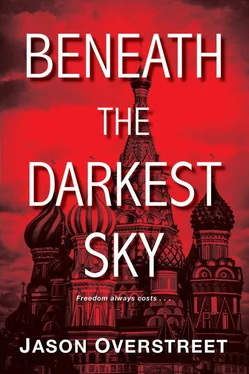“Your guests have arrived, Comrade Molotov,” the guard finally said.
“Good,” said Molotov, standing while the guard stayed posted inside the open doorway.
He nodded at us and opened his hand in the direction of the available red cushioned chairs in front of his desk. There were no handshakes. We sat and he followed.
“Thank you for meeting with us,” said Bobby, and I translated his words in Russian.
“It is my great pleasure,” said Molotov, expressionless, his squatty build and pudgy yet flat face like that of a certain breed of dog. Perhaps I was thinking of a Pug with eyeglasses and a mustache.
“Before we begin,” he said, “I would like to express something that brings me great pleasure, Comrade Ellington. Your interpreter is black. This is a very good thing. Our Great Stalin has invited… recruited… thousands of Americans to come work in the Soviet Union, or to study at either the University of Toilers or the International Lenin School, and we are happy that hundreds are black. It is a shame how your country treats these people.”
I translated to Bobby and he responded to Molotov with a simple, “I could not agree with you more, Comrade Molotov. I am not of that prejudiced ilk back home. I never have been.”
“The way your America treats its black people is a great symbol, as Lenin himself said, of what is wrong with capitalism. That is why blacks are coming here, many of them skilled laborers. And the whites, too! They can help with our industrialization process. We have no issue with admitting that we need America’s industrial technology.”
I translated, and Bobby said, “We look forward to building on the relationship we’ve only recently reestablished. President Roosevelt is sincere in his desire to open the channels of communication even more.”
“Do people get arrested in the United States?” asked Molotov.
“Of course,” said Bobby.
“And when you see them being arrested, how do you react?”
“I don’t react,” said Bobby. “I assume they’ve committed a crime and are being hauled off to jail for it.”
“Even if a group is arrested on the streets of New York City?” said Molotov.
Bobby waited for me and said, “Even then. I assume they’ve been involved in some type of illegal behavior.”
“So, then,” said Molotov, “why is it that so many foreign men and women seem to be confused when they see people being arrested here for committing crimes? It is no different than your country. People commit crimes… and they get arrested. Simple.”
“It’s eye-opening to look at it from that perspective,” said Bobby.
“Do you follow those arrested men and women back in America to the jails where they are being taken, or to the prisons thereafter?”
“No,” said Bobby.
“People don’t do that here, either. People don’t think seeing someone being arrested is odd. Countries have laws and police officers to enforce them. We are no different.”
“Absolutely,” said Bobby.
“I read in Pravda recently where an American writer named Richard Wright expressed his views on our society. He said, ‘Of all the developments of the Soviet Union, the way scores of backward peoples had been led to unity on a national scale was what had enthralled me.’ This Negro writer is one of your prized possessions. You must read what he said.”
Molotov began sifting through a stack of newspapers before handing me one. “Please, Comrade… what is your name?”
“Prescott Sweet.”
“Please, Comrade Sweet, read and translate this Richard Wright’s words for Comrade Ellington. Maybe he can share it with President Roosevelt so he can see that our government is not this evil machine that so many around the world are suggesting.”
“My pleasure,” I said, flipping the pages and finding the article. “Richard Wright goes on to say, ‘ I read in awe how the Communists had sent phonetic experts into the vast regions of Russia to listen to the stammering dialects of people oppressed for centuries by the czars. I had—’”
“Let those words sink in, Comrade Ellington,” said Molotov, cutting me off. “They are important. Continue, Comrade Sweet.”
“He writes further, ‘I had made the first total emotional commitment of my life when I read how the phonetic experts had given these tongueless people a language, newspapers, institutions. I had read how these forgotten folk had been encouraged to keep their old cultures, to see in their ancient customs meaning and satisfactions as deep as those contained in supposedly superior ways of living. And I had exclaimed to myself how different this was from the way in which Negroes were sneered at in America.’”
I handed the paper back to Molotov, who was almost smiling. I was actually glad to have read the opinion piece, for it shed even more light on a country I, as of yet, didn’t fully understand, and it helped that the views being espoused were those of a colored American.
Bobby and Molotov went on to discuss the issue of war debt, and my friend did his best to gauge the Premier’s feelings on the subject. We were hoping that Molotov would say something that was in direct conflict with Litvinov. The ambassador had it in his mind that Stalin himself had been kept out of the loop a bit on the debt issue, and that Litvinov had been withholding information from the Politburo. But we soon found out from Premier Molotov that this was not the case. All of them saw the debt issue the same way. They didn’t want to pay it for fear that other countries would come trying to collect their claims. “That debt was accrued during czarist times,” Molotov had said. “In case you hadn’t noticed, Comrade Ellington, we are not czars.”
* * *
The following months rolled by rather fast and it was now late September. Loretta and I were heading to the Foreign Workers’ Club to meet Lovett Fort-Whiteman. Since April, I’d been to several of Loretta’s showings, as her paintings were quickly drawing the attention of some powerful people, including Stalin himself. She’d done a grand presentation in Leningrad that had taken us out of town during the big Spring Festival at Spaso. The party had been for the entire diplomatic corps in Moscow.
Part of me was glad to have missed the massive shindig, although I’d heard all of the details about the animals from the zoo—mountain goats, white roosters, a baby bear, pheasants, parakeets, and one hundred zebra finches. It had all been part of a barnyard motif, and apparently Bullitt had successfully pulled off the grandest diplomatic party in Moscow history. Several members of the Politburo drank until the wee hours of the morning, and other than Stalin himself, just about every important man in Moscow had attended. Bobby had raved about it being “so absolutely odd that it was actually brilliant.”
Since I’d been out of town during the formal event, I’d pressed Bobby for more details. Apparently Karl Radek had substituted the baby bear’s milk with champagne, prompting it to vomit on a Soviet general. One thing Bobby and I couldn’t wrap our heads around was why these Spaso shindigs had to have animals present. It all seemed so odd to us.
Besides the party I’d missed, there were other events from the past months to reflect on. After the meeting with Premier Molotov back in April, I’d left Bobby at the chancery and headed to Spaso to meet with Ambassador Bullitt, per his immediate request. I’d arrived to find him arguing back and forth with his French butlers about whether to keep his office where it was across from his library or make the library his office. Apparently he’d already switched back and forth quite a few times since first arriving the previous year because he couldn’t get comfortable. He was glad I’d arrived to break up the argument, and so were his butlers.
Читать дальше











